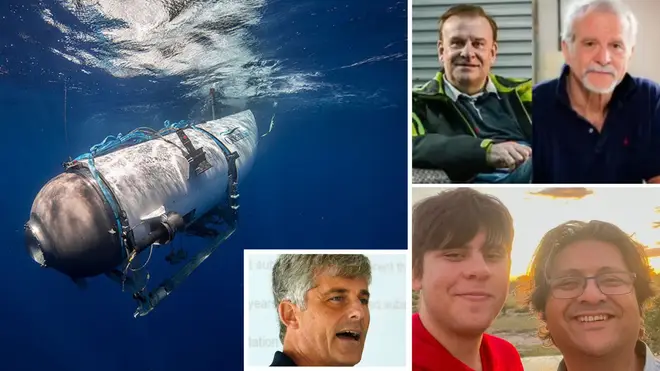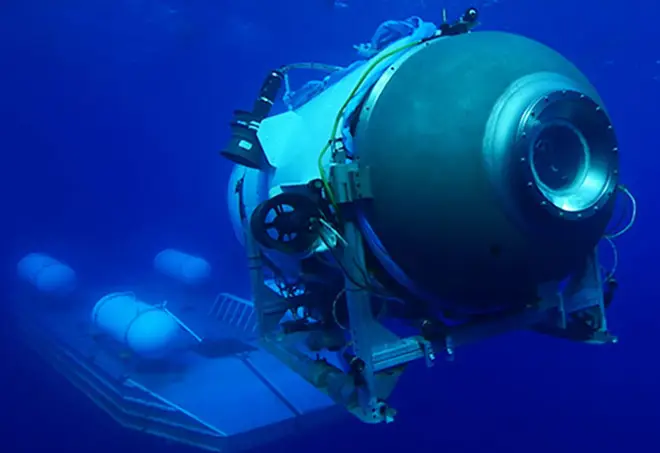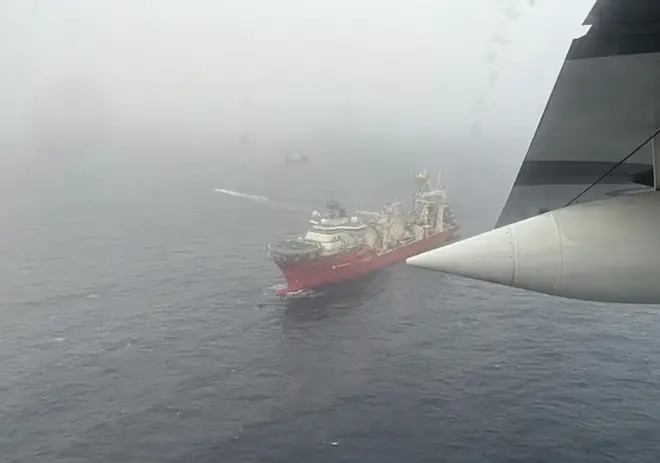
Nick Abbot 10pm - 1am
22 June 2023, 10:25

The five people on the missing Titan submersible have until 12.08pm UK time before their oxygen runs out, the Coastguard has said, as officials insisted they were still carrying out a search and rescue mission.
The boat was descending to the depths of the Atlantic Ocean, hundreds of miles off the coast of North America, in a bid to visit the wreckage of the Titanic.
Rescuers have been hunting for the 6.7 metre-long vessel since Sunday, when the ship's handlers lost contact with it. Hope has been sparked by sounds of banging that officials think could be the passengers trying to send a message, but others have warned that the search is extremely difficult.

The boat had 96 hours of oxygen supply to start with, and its passengers are expected to run out at 7.08am local time (12.08pm UK time), a spokesperson for the US coastguard said.
"We have to remain optimistic and hopeful when we are in a search and rescue case," Coastguard captain Jamie Frederick said.
"If we continue to search, potentially we could be at that point... And that's a discussion we will have with the families long before I am going to discuss here publicly."
He added: "We always have hope - that's why we're doing what we do."

Titanic tourists have 'four possibilities left' but the 'clock is tick
But Tom Sharpe, a former patrol boat commander in the Royal Navy, said on Wednesday that the banging sounds picked up on sonar could be a mirage.
He told LBC's Nick Ferrari on Thursday morning that "there's always an issue with confirmation bias" on search and rescue missions.
"If you’re looking for a red flare, or you’re looking for a periscope… there’s always a handful of people who pop up saying that’s what they think they’ve seen. The ocean’s a noisy place - they’re in the vicinity of the Titanic, which is made of metal.
I have a horrible feeling that the sounds heard may well be confirmation bias, rather than tapping on a... hull at 3,800 metres.I hope I’m wrong but that’s what it feels like."
Mr Sharpe added that he believes there is only one possible outcome in which the five passengers could survive - if they have already got to the surface undetected, and rescuers get them out of the Titan within the window.
If they are "stuck at depth", rescuers probably do not have enough time to get down to them and bring them out before their oxygen runs out, he said.
OceanGate has come under fire in recent days, as people recalled pulling out of trips to the depths over safety concerns, and others claimed that previous voyages have also lost contact.
Mr Sharpe said that all exploration comes with risk, but added that "it feels that this mission crossed the divide from pioneering derring do to gambling."

The search area for the sub has massively expanded in the last 24 hours to two times the size of Connecticut, which is around 5,000 square miles.
Five specialist vessels backed by deep-sea robots and search-and-rescue aircraft are already searching the are up to a depth of 2½ miles. But their number is set to double before the air supply deadline.
Among robot subs joining the last-ditch bid are the Victor 6000 and a US Navy CURV21.
Victor 6000 is operated by a 25-strong crew which can work non-stop for up to 72 hours.

Locator map of Titanic shipwreck as search continues for missing submersible
"We don't need to stop at night," said Olivier Lefort from Ifremer, a French research institute that operates the robot.
"Victor is able to do visual exploration with all the video equipment it has", Mr Lefort said.
"It is also equipped with manipulating arms which could be used to extricate the sub, such as by sectioning cables or things that would be blocking it at the bottom."
Meanwhile, the US Navy CURV21 can salvage wreckage and craft up to 20,000ft down.

Captain Frederick said on Wednesday that despite hearing noises during their search they were still not sure what they were.
"It was my understanding that the P3 had heard some noises today as well," he said.
As a result, ROV (remotely operated vehicle) operations have been relocated in an attempt to explore the origin of the noises.
"The data from the P3 aircraft has been shared with our US Navy experts for further analysis which will be considered in future search plans," Mr Frederick said.
Meanwhile, Carl Hartsfield, from the Woods Hole Oceanographic Institution, saisd: "The ocean is a very complex place, obviously human sounds, nature sounds, and it's very difficult to discern what the sources of those noises are at times, but I can tell you that this team has multiple sensors that are in the area, they're sending data back expeditiously to the best people in the world to analyse that data and they're feeding the results of the analysis back to the unified team and they're making decisions.
"There have been multiple reports of noises and every one of those noises is being analysed, tracked, looked for patterns and reported upon."
Listen and subscribe to Unprecedented: Inside Downing Street on Global Player


Meanwhile footage has shown the moment the sub began its decent down towards the wreckage as rescuers race to find the vessel.
Abbi Jackson, who appears to have been employed by the company onboard the mothership, filmed the vessel as it made its descent at the weekend.
She shared the clip on TikTok earlier in the week, captioning it: "Watching a submarine go down to the Titanic."
She had also previously created a video on one of the missing passengers - French explorer Paul-Henry Nargeolet - labelling him a legend and saying: "This man has seen the Titanic 37 times".
Read more: Has the Titanic sub been found? Timeline of events and latest updates

The explorer who narrowly avoided trip on missing OceanGate sub
It comes after a friend of Mr Harding, Chris Brown, told LBC's Tom Swarbrick that he originally signed up to join the expedition but pulled out after paying £110,000.
"I paid £110,000 before the mission went out," Mr Brown said.

Michael Guillén on his experience of diving to see the Titanic
"I pulled out fairly early on. I don’t want to go into reasons while they're still searching."
However he did confirm the reasons were related to safety concerns.
Mr Brown went on to say: "One of the things that you’ll find in common with modern explorers is you go into these things knowing the risks.
"You always know there’s a risk there and that’s something you tend to accept."